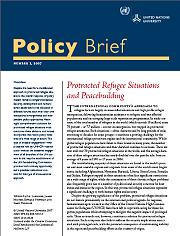ISSUE 46: JUNE-AUGUST 2007
network of research and training centres/programmes
FRONT PAGE | ARCHIVE |
Long-term refugees pose challenge to
peacebuilding
As intense fighting broke out between
Lebanese troops and militants at a camp that houses some 40,000
Palestinian refugees, UNU published a timely new policy brief addressing
the challenges of protracted refugee situations.
Protracted Refugee Situations and Peacebuilding, written by Gil Loescher (Oxford University), James Milner (University of Toronto), Edward Newman (UNU) and Gary Troeller (MIT), is one of the outputs of the UNU Peace and Governance Programme project on The Politics, Human Rights and Security Implications of Protracted Refugee Situations.
 |
|
Edward Newman |
"While the international community focuses on on mass influx situations and high profile refugee emergencies, this policy brief highlights the 70 percent of the world's refugees who are not in emergencies but trapped as protracted refugees," said co-author Edward Newman, director of studies on conflict and security with UNU Peace and Governance Programme. "Such situations, characterized by long periods of exile, stretching to decades in some cases, constitute a growing challenge for the international refugee protection regime and the international community."
Despite the need for a multifaceted approach to protracted refugee situations, the overall response of policy makers remains compartmentalized with security, development and humanitarian issues mostly being discussed in different forums, each with their own institutional arrangements and independent policy approaches. The UNU policy brief argues that comprehensive solutions for protracted refugee situations must overcome these divisions and incorporate a wide range of actors. Other conclusions include:
- The resolution of refugee problems must be seen as a primary, not a secondary, issue for peacebuilding. Protracted refugee situations can undermine peacebuilding initiatives in conflict-prone regions.
- The challenges demand a holistic approach which transcends purely humanitarian policies. This approach must be multifaceted and embrace security, development and humanitarian in an integrated manner, and incorporate a wide range of actors.
- The composition of the Peacebuilding Commission (PBC) places it in a unique position to take a broad approach to the challenges of protracted refugee situations. However, the approach must be thematically comprehensive and it must address the regional dimensions of long-term displacement and peacebuilding, including challenges which fall outside the country under consideration. One-dimensional, country-specific approaches run the risk of neglecting challenges outside the country – including protracted refugee situations – which could upset post-conflict recovery.
- The PBC should seek to deepen understanding of the links between long-term displacement and peacebuilding. A wider recognition of the role of refugees and the regional dynamics of peacebuilding will be an important pre-condition for the success of the PBC, especially as it undertakes country-specific deliberations on Burundi and Sierra Leone. Conflict in both countries is tied to broader regional dynamics and neighboring conflicts. The refugee issue is both a consequence and a source of the perpetuation of conflict.
© 2007 United Nations University
